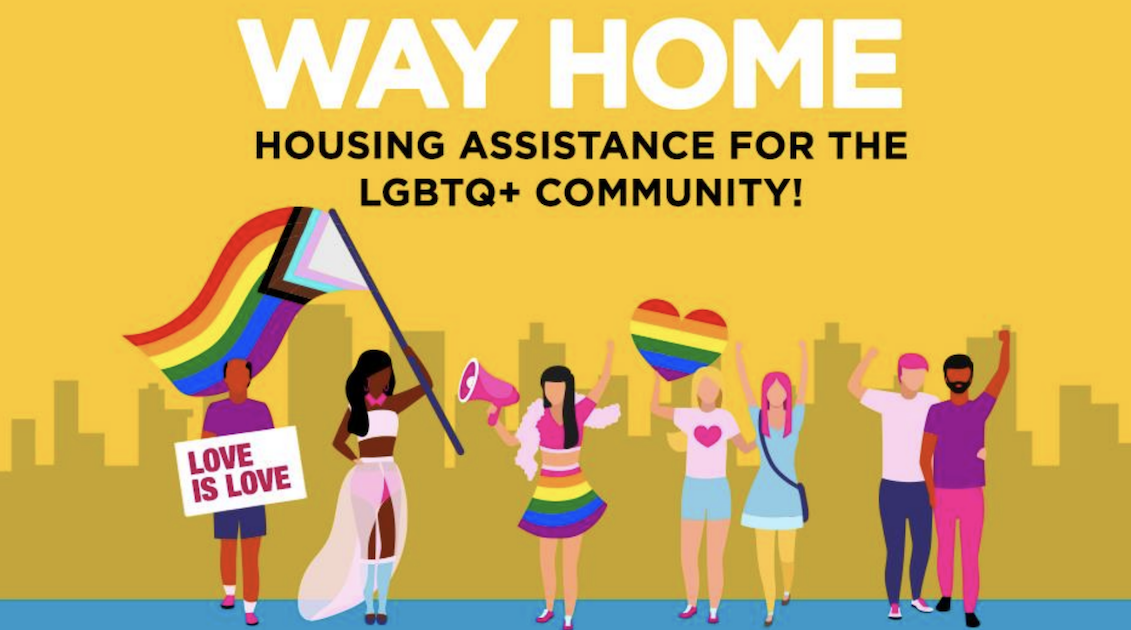
Philly’s Way Home navigates solutions on housing for LGBTQ+ people through first-in-the-country program
AL DÍA met with members of the Way Home organization to discuss homelessness among LGBTQ+ people in Philly.
The Way Home program is a rapid, rehousing project that has been making an impact in Philadelphia.
Founded through striking collaboration, the program is the first of its kind in the country and first designed specifically for LGBTQ+ adults.
The program is now about a year and a half old, and funded through the city. Way Home was launched by SELF Inc. and the William Way LGBT Center.
Operated through SELF, Inc., the program is a component of the William Way LGBT Community Center and the Philadelphia Office of Homeless Services’s Rapid Re-Housing (RRH) project.
Rapid Re-Housing is a housing first model, and is meant to be a model of extremely low barrier.
Referrals come from the Office of Homeless Services (OHS) Clearinghouse through the Coordinated Entry and Assessment Based Housing Referral System (CEA-BHRS).
By utilizing a $400,00 CARES Act grant, Way Home will — for a year — pay a portion of the rent of 40 LGBTQ+ residents who have been facing homelessness.
The program is LGBTQ+ affirming, transgender competent, anti-racist, and offers billingual services. Staff members who speak Spanish are available to help Spanish-speaking applicants.
“We’re wanting to center language access and justice in this,” said Cara Tratner, Housing Assistant Director at SELF, Inc. “There are systemic barriers for Spanish speakers and immigrant communities particularly to accessing shelter.”
Approximately five out of 30 who enrolled in the Way Home program have identified as Latino or Latina, several of whom speak Spanish.
Way Home offers rental assistance for individuals suffering from homelessness, and focuses specifically on LGBTQ+ folks. The program has chosen a goal in the combating of homelessness among transgender and gender non-comforming adults.
“One very easy thing I can say about homelessness, particularly among trans individuals, is [that] we just haven't done a great job, ever, of knowing just how widespread homelessness is in LGBT communities and in trans communities specifically,” said Michael Hinson, President and Chief Operating Officer of SELF, Inc.
The rate of homelessmess among these groups has been reportedly rising since 2017, but so has the visibility of homeless trans individuals.
“Some folks are saying there’s been an increase. Well, part of the increase is [they’re] collecting more information,” said Hinson. “There’s still barriers. Really huge barriers to LGBT folks coming into the housing system or homeless system.”
Despite more attention being paid to affected communities, some worry that lacking information and understanding still stands in the way of solution.
Barriers stand between trans people and the housing system, especially affecting groups such as those in Latino communities, African immigrant communities, non English-speaking communities, and communities of young people.
The Way Home program utilizes a process embracing LGBTQ+-friendly landlords in the city. After locating a landlord and apartment for an individual, the Way Home program helps to pay for housing, and then helps connect individuals with jobs and services.
Still, Way Home finds it challenging to find LGBTQ+ landlords, or any landlords who are interested in working with people recovering from homelessness.
When undergoing the screening process, households will not be screened out for assistance based on criteria that “assumes to predict” successful outcomes, such as: employment, criminal history, mental health history, medical history, and evidence of motivation.
This process omitted by Way Home is often not abandoned. When trying to predict success, the answer is usually who appears to be the most employable.
“In a system where Black trans folks have so many barriers to getting employment, that are less likely to find employment in that year because of all the layers of discrimination… that doesn’t mean they shouldn’t deserve their basic right… human right of having housing,” said Tratner.
When considering what criteria predicts successful outcomes, and how to avoid the pitfalls of such a system, it depends on how success is defined.
In any case, a tenet’s success post-assistance does not define the achievements they made while being assisted.
RELATED CONTENT
“Somebody who may have severe mental illness might not be able to stay permanently housed after this program, because they don’t have all the resources and supports they need, but in our mind that doesn’t mean they shouldn’t still get housing,” said Tratner.
To be eligible for the Way Home program, an individual must be 18+ years of age, at or below the 30% of Section 8 Area Median Income (AMI), and living in an emergency shelter or somewhere not suitable for living such as one’s vehicle.
As of now, Way Home is receiving an overwhelming number of submissions for housing assistance. The program’s waitlist was recently sitting at more than three times its capacity, as reported by Billy Penn.
Amid these obstacles, Philly’s lack of affordable housing overall adds to the challenge.
“If we are not increasing housing stock that is generated for poor people… people who are living on a $15 or lower minimum wage, folks who are elderly and have fixed incomes… [then] housing for those folks without some kind of subsidy, without some kind of support or service, is really unfortunately a dream,” said Hinson.
Some who apply to the program have been subject to a waitlist requiring months of patience. The lack of clarity surrounding definite housing may cause further anxieties for homeless applicants.
“A lot of people need more than one year of housing support because of our affordable housing crisis,” says Tratner.
Going forward, Way Home will first run for a year of rehousing service, and then the program will assess this period to consider how best to move forward.
Considering the amount of applicants, the program can hopefully move forward with another round of housing assistance.
Hinson believes factors contributing towards homelessness are interconnected, and a reflection of a broken system refusing to offer a clean slate to those who need it.
“By the time someone is homeless, and needs homeless or housing services, that is just a symptom indicative of a system that has comprehensive failure for very particular groups of people,” said Hinson.
With so many applicants coming forward, it is worrisome there aren’t more resources spread across the city to ensure Philly’s population is housed, but Way Home is a start.
Further information on the Way Home program and forms of contact can be found on the program’s overview.
 This article is part of Broke in Philly, a collaborative reporting project among more than 20 news organizations focused on economic mobility in Philadelphia. Read all of our reporting at brokeinphilly.org.
This article is part of Broke in Philly, a collaborative reporting project among more than 20 news organizations focused on economic mobility in Philadelphia. Read all of our reporting at brokeinphilly.org.











LEAVE A COMMENT: